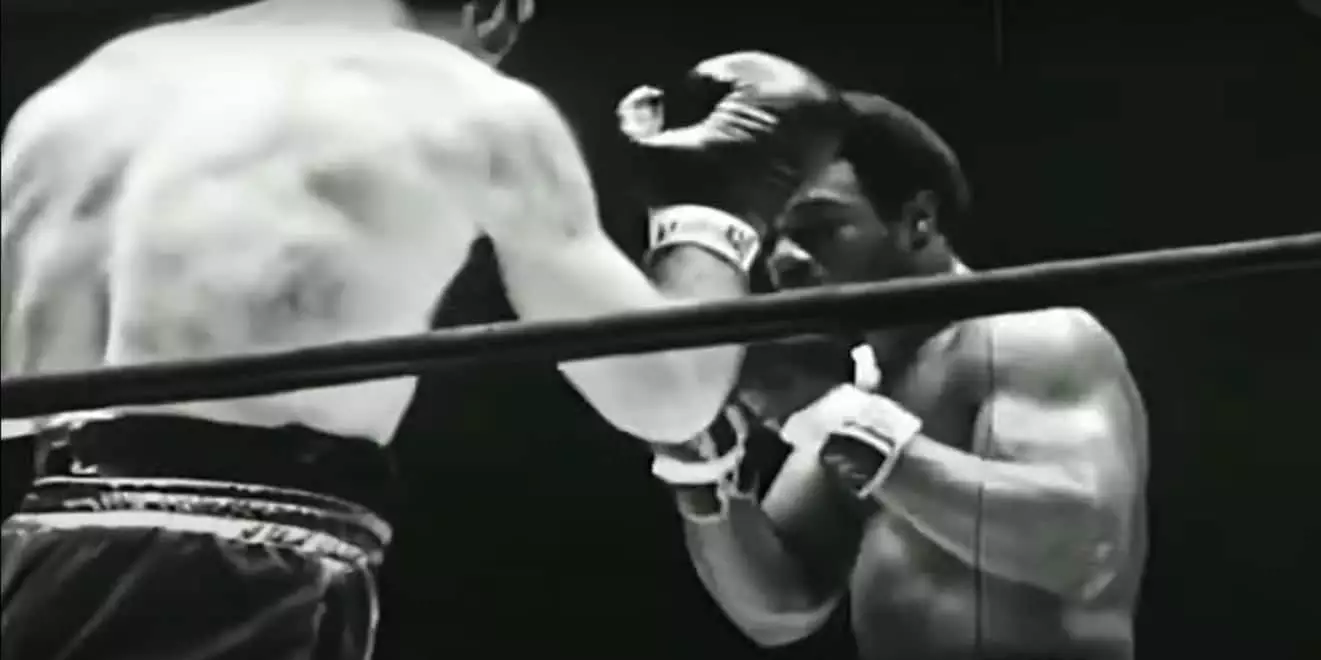In the vibrant heart of New York, 1970 marked an intersection of two distinct worlds—boxing and cinema—when Jack O’Halloran, a fighter known for his towering stature and considerable talent, faced off against the future legend George Foreman at Madison Square Garden. On that fateful night, two giants clashed not only in terms of physicality but also in their aspirations for greatness. Foreman, just 21 years old and a rising star with a raw fighting style, was poised to create a heavy impact in the boxing realm, while O’Halloran stood as a testament to the grit and determination of the era’s fighters. Their battle was a rough-and-tumble spectacle that captivated boxing fans, showcasing O’Halloran’s prior experience against formidable opponents—an advantage that seemed promising at the outset.
As the match unfolded, the momentum fluctuated between the two heavyweights. For the initial rounds, O’Halloran appeared to hold his own against Foreman, demonstrating his tactical acumen and resilience. However, it was in the fifth round that the tide turned dramatically. Foreman, capitalizing on a momentary lapse in O’Halloran’s defense, delivered a devastating blow that sent O’Halloran to the canvas. The controversy surrounding the fight’s conclusion—O’Halloran’s insistence that he had risen before the referee’s count began—is a telling reflection of the fine line between victory and defeat in boxing. Foreman, victorious and bolstered by this win, continued on his trajectory to become a boxing legend, ultimately claiming the world heavyweight title by famously defeating Joe Frazier.
Following his encounter with Foreman, Jack O’Halloran’s career took him through a gauntlet of notable boxing figures. Despite losing to high-caliber opponents like Ken Norton and Ron Lyle, there remained an indomitable spirit in O’Halloran. His longing to compete against Muhammad Ali defined his aspirations during this period. O’Halloran’s accounts reveal a fighter who was ready to leap into the ring with Ali, a dream that unfortunately echoed in the forlorn wishes of many fighters who yearned for the spotlight that Ali commanded. O’Halloran’s resilience is commendable, yet the boxing landscape of the time was unforgiving and often determined by moments that were beyond a fighter’s control.
After the bout with Foreman, O’Halloran’s boxing legacy became intertwined with his foray into Hollywood. Although his prowess in the boxing ring was solidly documented, it was his foray into acting that would eventually captivate a new audience. His portrayal of the character “Non” in the blockbuster films “Superman” and “Superman II” showcased a different kind of strength. O’Halloran was able to channel his experiences from the ring into his performances on screen, cementing his status as a cultural figure.
The transition from the boxing ring to a Hollywood set is a path less traveled and often fraught with challenges. For O’Halloran, mentorship under the legendary Robert Mitchum provided a significant foothold in the film industry. Through Mitchum’s guidance, O’Halloran was able to evolve from a mere boxer to an iconic character portrayed vividly on screen. His performances resonated with audiences, establishing him as a beloved figure that went beyond his previous athletic endeavors. While some critics may argue that O’Halloran’s prowess as a fighter did not translate to the highly competitive field of acting, his successful portrayal of Non has ensured that he remains a distinguished personality recognized by both boxing fans and moviegoers.
Today, as O’Halloran reflects on his career at the age of 81, his views offer insight into the volatile nature of both boxing and film. The melancholy of unfulfilled fights, such as one against Ali, is tempered by the joy he derives from his time on screen. The bitter and the sweet intermingle—what could have been versus what was achieved. Although his boxing career might not have reached the legendary heights he imagined, O’Halloran’s legacy within both worlds remains significant. His journey underscores the idea that while success in the ring can be fleeting, the impact of a successful portrayal in cinema can transcend time. Thus, in analyzing the life of Jack O’Halloran, it becomes clear that greatness can manifest in myriad forms, embracing a path that is uniquely personal and profoundly influential in the broader tapestry of sports and entertainment.


Leave a Reply